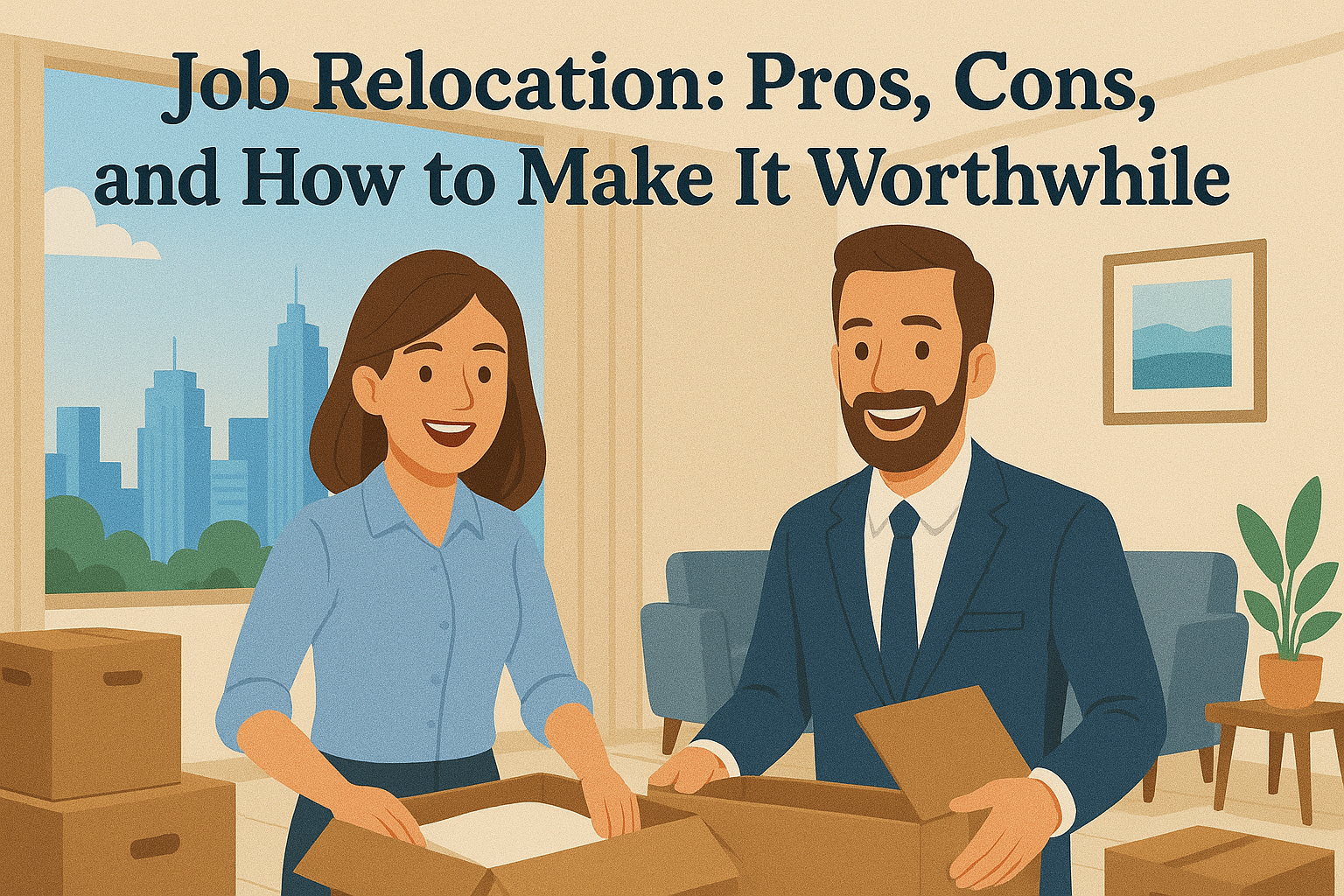Considering Relocating for Work? Here’s What You Need to Know
Relocating for a new job can be both exciting and intimidating. Whether it’s across the state or across the country, moving for work is a major life decision that can reshape your career and personal life. With more companies offering relocation packages and remote roles evolving into hybrid setups, understanding the pros and cons of job relocation has never been more important.
In this article, we’ll break down the benefits and drawbacks of relocating for work — and offer practical tips to make the transition smooth, rewarding, and truly worthwhile.
The Pros of Job Relocation
Career Growth Opportunities
Moving to a new city or region can open doors to better job titles, higher salaries, and more advancement opportunities. Many major employers are headquartered in specific metro areas, meaning relocation might be the key to getting closer to the action — and the decision-makers.
Increased Compensation and Benefits
Companies that request relocation often sweeten the deal with relocation bonuses, housing stipends, or moving assistance. In competitive industries, this can add up to significant financial gain, making the move both professionally and economically rewarding.
Fresh Start and Networking Potential
A new environment means new people, new ideas, and new perspectives. Relocating can expand your professional network and help you build valuable connections that would be harder to access remotely.
Personal and Lifestyle Growth
Relocation offers a chance to experience a different culture, lifestyle, or climate. Whether it’s moving from a small town to a vibrant city or vice versa, the change can help you grow personally and rediscover your priorities.
The Cons of Job Relocation
Emotional and Social Disruption
Leaving behind friends, family, and familiar surroundings can be emotionally challenging. It often takes months to build a new social circle or feel truly “at home” in a new place.
Hidden Costs
Even with a relocation package, moving isn’t cheap. Temporary housing, transportation, and cost-of-living differences can all add up quickly. Always calculate your total cost of relocation before signing an offer.
Career Risk
Sometimes, the new job doesn’t live up to expectations — and moving back isn’t always easy. Before relocating, ensure the company’s stability, culture, and long-term fit align with your career goals.
Adjustment Stress
New cities come with new routines, traffic patterns, and lifestyles. Adapting takes time, and the stress of change can affect productivity and well-being, especially in the first few months.
How to Make Job Relocation Worthwhile
Research Thoroughly
Learn everything about your new location — from living costs and neighborhoods to healthcare, schools, and commute times. Use resources like Numbeo or city relocation guides to get accurate data.
Negotiate a Strong Relocation Package
Many professionals overlook this. Ask for moving expense coverage, temporary housing, and paid travel for house-hunting trips. Some employers may even help with home sale assistance or spousal job support.
Build a Support System Early
Join local professional associations, coworking spaces, or online community groups. Building relationships early will help you adjust faster and feel more connected.
Consider Furnished Home Rentals
If you’re not ready to buy or sign a long-term lease, a furnished home rental can make relocation much easier.
- Short-term rentals (30 days to 6 months): Ideal for transitional periods or while scouting neighborhoods. Websites like HouseStay and Zillow list flexible, move-in-ready options.
- Long-term furnished rentals (6+ months): Perfect for professionals planning to stay longer but who prefer not to buy or move furniture. Sites like Furnished Finder and ForRent.com offer stable, furnished homes for extended stays.
Choosing a furnished rental gives you flexibility and comfort while you get established — often saving time, stress, and setup costs.
Visit Before You Move
If possible, take a pre-relocation trip to explore neighborhoods and assess how well the area fits your lifestyle.
Keep a Backup Plan
Have an exit strategy in case the role doesn’t meet your expectations. Renting for the first year instead of buying a home offers flexibility if you need to make another move.
Key Takeaways
- Job relocation can boost your career with better roles, pay, and growth opportunities.
- Weigh the emotional and financial costs before deciding.
- Furnished rentals can ease your transition, especially short-term while you get settled.
- Negotiate your relocation package — it can save thousands.
- Research and plan thoroughly to make your move smooth and worthwhile.
FAQ
Q: How long should I stay in a job after relocation?
A: Most professionals aim to stay at least 2–3 years to make the move financially and professionally worthwhile.
Q: What should be included in a relocation package?
A: Coverage for moving expenses, temporary housing, travel reimbursements, and assistance with selling or buying a home.
Q: Are furnished rentals worth it for relocation?
A: Yes — they provide flexibility and reduce moving stress, especially during your first months in a new city.
Sources
- U.S. Bureau of Labor Statistics – Geographic Mobility of Workers (2024)
- Forbes – How To Negotiate a Relocation Package (2024)
- SHRM – What Employers Should Include in Relocation Assistance (2023)
- Zillow – Furnished Apartments in Land O’ Lakes, FL
- Furnished Finder – Monthly Furnished Rentals in Florida
- HouseStay – Short & Long-Term Furnished Rentals in Land O’ Lakes, FL
- Numbeo – Cost of Living Comparison by City (2025)

